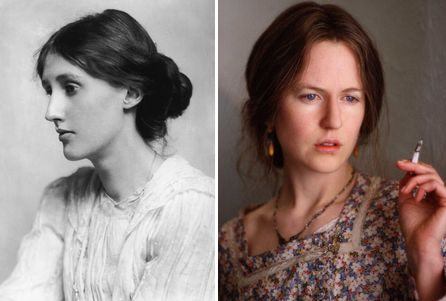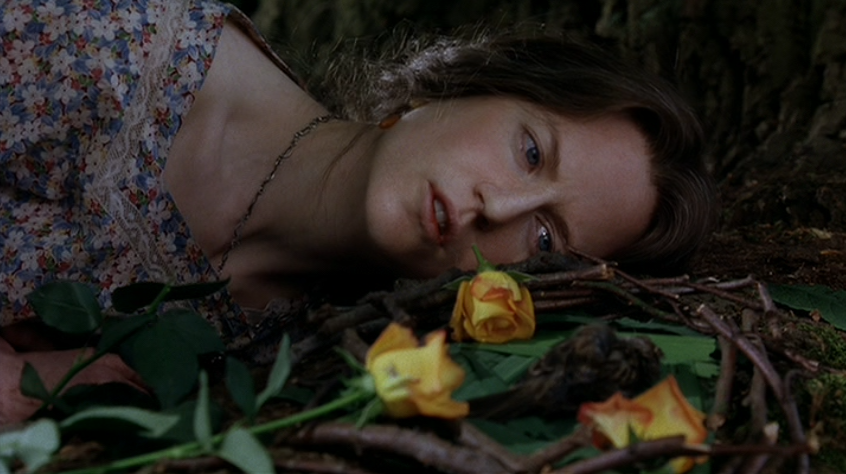Our Women's History Month posts, celebrating real actresses as real women conclude with abstew on Virginia Woolf & The Hours.
Virginia Woolf
Born: Adeline Virginia Stephen was born January 25, 1882 to Sir Leslie Stephen and Julia Prinsep Duckworth Stephen in London, England. Her father was an author, historian, and critic while her mother was known for her beauty, even posing as a model for Pre-Raphaelite painters.
stone-filled pockets and golden statues after the jump...
 Virginia Woolf (1882-1941) and Nicole Kidman (1967-)
Virginia Woolf (1882-1941) and Nicole Kidman (1967-)
Death: Having battled mental illness her entire life, Woolf suffered a depression and began to hear voices that would lead to her suicide. On March 28, 1941, she filled the pockets of her housecoat with stones and walked into the River Ouse near her home in Sussex. Her body was not recovered until April 18. Her cremated remains are buried at her home Monk's House which is now open to the public.
Her Extraordinary Life: An early feminist that bemoaned the lack of formal higher education for women and considered one of the most important figures in early 20th Century Literature, Virginia Woolf is credited for creating the post-modern novel due to her stream of consciousness writing style in books like Mrs. Dalloway (1925), To the Lighthouse (1927), and Orlando (1928). A member of the literary circle known as the Bloomsbury Group, it was within this group that she met and eventually married Leonard Woolf. The two set up Hogarth Press in 1917 which published all of Virginia's works (usually with cover art by her sister Vanessa) including the novel-length essay about what it takes to be a female writer, A Room of One's Own.
Nicole Kidman The Hours (2002)
 Oscar Nominations Received by the Film: Although nominated for 9 Academy Awards, the film's only win was for Nicole's portrayal of Virginia Woolf for Best Actress. It was also nominated for Best Picture, Best Director (Stephen Daldry), Best Adapted Screenplay, Best Costume Design, Best Film Editing, Best Original Score, Best Supporting Actor (Ed Harris), and Best Supporting Actress (Julianne Moore).
Oscar Nominations Received by the Film: Although nominated for 9 Academy Awards, the film's only win was for Nicole's portrayal of Virginia Woolf for Best Actress. It was also nominated for Best Picture, Best Director (Stephen Daldry), Best Adapted Screenplay, Best Costume Design, Best Film Editing, Best Original Score, Best Supporting Actor (Ed Harris), and Best Supporting Actress (Julianne Moore).
The Other Best Actress Nominees: Salma Hayek Frida, Diane Lane Unfaithful, Julianne Moore Far From Heaven, Renée Zellweger Chicago
By the time Denzel Washington announced that Nicole Kidman had won Best Actress "by a nose" at the 75th Academy Awards, there had already been so much press about how Nicole had transformed herself into Virginia Woolf with a prosthetic nose that his joke seemed to, once again, reduce her performance to little more than that. Hopefully in the 11 years that have passed since then, we can come to see the fully-realized performance for what it is and not just one cosmetic part.
The truth is I absolutely love The Hours. Love the novel by Michael Cunningham. Love Virginia Woolf's Mrs. Dalloway. Love this film. I've watched it so many times over the years and each viewing brings new discoveries. That it stars three of the greatest working actresses doesn't hurt either. Usually when a story is divided into parts, there's one that that doesn't grab you as much but that's blissfully not the case here where all three story lines hold equal weight like three fragments of the same soul.

Unlike a traditional biopic, the film interweaves together 3 women at 3 different times: Virginia Woolf as she writes Mrs. Dalloway, Laura Brown (Julianne Moore) in the 1950's as she reads the novel, and Clarissa Vaughan (Meryl Streep) as a modern-day version of Mrs. Dalloway. Other than the bookends of the film which depict Woolf's suicide, the entirety of the film takes place within the confines of one day.
And in that day her whole life."
Nicole immersed herself completely in playing Virginia Woolf. It was the first time that she played a well-known, real-life woman. The left-handed actress taught herself to write with her right as Woolf did and also learned to imitate the author's handwriting as closely as possible. (The suicide note in the film is actually written by Kidman herself.) She also lowered the register of her voice to make it huskier. But more than the physical transformation, Kidman delves deep into the dark waters of depression, showing us the troubled soul beneath the sharp mind. She is a woman at a constant battle with her own brain. It is the very source of her work and imagination, but at the same time, it fails her as it constantly brings her down with thoughts of failure and despair. (Woolf said the voices she heard were angry men's voices telling her that she wasn't good enough.)

Throughout this one day in the life of Virginia Woolf, we really do get an encapsulation of her entire life. We see her as the muse visits ("Leonard, I believe I may have a first sentence."). We see the relationship she has with her sister Vanessa Bell (Miranda Richardson) who comes with her three children to see how her sister is doing ("I'm saying, Vanessa, that even crazy people like to be asked."). Virginia even comes face to face with death as they have a funeral for a bird so that the creature may return to where she came from. But it all comes to a head when Virginia confronts Leonard (Stephen Dillane) at the train station as she tries to run away to London. She is suffocating within the confines of the small town and stifled by Leonard's constant protection of her. Kidman as Woolf, like a caged bird trying to break free, wails against her treatment, but ultimately reasons with Leonard saying that she would rather die than face the life she has come to know. Leonard eventually gives in, all the while knowing that granting her freedom will ultimately bring about her demise. But just as the two leave the station, Virginia, telling the audience as much as Leonard himself, sums up what we must ultimately take away from the film,
You cannot find peace by avoiding life.

[Lots more on The Hours here. It's one of TFE's favorite communal films]
Previously on Women's History Month
- Laura Dern as Katherine Harris
- Anne Bancroft & Patty Duke as Annie Sullivan and Helen Keller
- Greer Garson as Madame Curie
- Ingrid Bergmas as Joan of Arc
- Lottie Reineger, an important early figure in animation